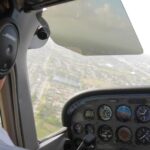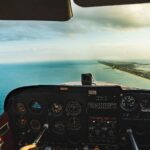You have dreamed about becoming a pilot or how to become a commercial pilot your whole life; from the time you looked up and saw that beautiful airplane streak by or simply from a story that you once heard. Regardless of the source that lit the flame, the stage was set .
Answering the question of how to become a commercial pilot or private pilot means flying airplanes, right? Not entirely. There are many rewarding career opportunities in aviation for pilots besides “just flying airplanes.” It is impossible to identify every opportunity because they are all different.
Aviation, regardless of whether it is commercial, general, or military, is unique in that it intertwines with every facet of society. So as many different personal interests that a pilot may have,that is how many different career opportunities there are in aviation. If you want proof of this, just ask a pilot why he or she flies. Their responses will be similar but different. When you mix passion, hobbies, professional interests, education, work ethic, and religion into one, we are no longer talking about a career but rather a lifestyle. With perhaps the exception of a commercial pilot, many of us have a hard time defining where our career ends, and our hobby begins.
So how do you choose the right path? While this may seem like a daunting question, the answer is quite simple. As you progress through your flight training, you will have the opportunity to meet pilots from all walks of life. Listen to their stories. Listen to all of the hangar talk. Yes, their stories will almost always be embellished, but listen to the tone in their voice, their enthusiasm. You will hear the good and bad of different types of flying. As you hear these stories, you will slowly begin to define your own path.
One beneficial way of learning and meeting interesting people is to become a flight instructor. As you begin to teach, you will be amazed at the students you meet and the purposes for which they plan to utilize their newly gained skills. You will learn more about flying by teaching for one year than anything else that you do. CFIs learn to think ahead of the airplane and the student and to anticipate what “may” happen.
I caution you not to fall into the cookie-cutter, stereotypical role of a pilot. By defining your own path, you will find yourself in the position of creating your own jobs and finding new opportunities. No matter how long you fly, there will always be bigger and faster airplanes. If that is what motivates you, then great, go for it. Plot your course and introduce yourself to people who can help you achieve that goal.
If you enjoy helping people, there are thousands of missionary flight departments and air ambulances all over the world.
Perhaps the business is your thing. There are countless positions with aircraft sales companies, maintenance shops, financial institutions, manufacturers, and yes, even flight schools.
Ok, so you say that you are “cut from a different cloth.” You like adventure and enjoy “staying off of the beaten path.” Between bush flying, seaplanes, parachute dropping, banner towing, utility inspections, animal rescue, there is always something for you to do.
Commercial airlines come in all different shapes and sizes. When we typically think of a commercial airline, we tend only to discuss those that are working out of the U.S. However; there are hundreds of “ex-pats” (Americans working overseas) flying for foreign-based airlines in Asia, Africa, the Middle East, and other parts of the world. These jobs are usually structured in terms of schedules, standardization, and training.
Many pilots enjoy flying “corporate,” which is indeed the answer to how to become a commercial pilot, which takes on a whole other plethora of meanings. These operators include charter departments, corporate flight departments, flying an airplane for an individual, or flying for a government agency. These jobs are usually less structured and “on call.”










